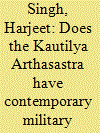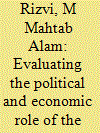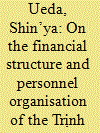| Srl | Item |
| 1 |
ID:
154425


|
|
|
| 2 |
ID:
114342


|
|
|
|
|
| Publication |
2012.
|
| Summary/Abstract |
The Islamic Revolutionary Guards Corps (IRGC) is Iran's most powerful security and military organisation, responsible for the protection and survival of the regime. Over time, the IRGC has attained a position of dominance vis-à-vis the regular army (Artesh). In due course, the Guards have also been transformed into a leading political and economic actor. The major political role of the IRGC started with the election of the reformist presidency. However, the Guards' involvement in the Iranian economy began during Rafsanjani's presidency. In view of the importance of Iran and its military, especially the IRGC, this article seeks to analyse the political and economic roles of the IRGC. The article argues that the IRGC's political and economic role is likely to increase due to its unique relationship with Iranian political elites and in view of the current power struggle between various political factions within Iran. However, any such expansion of the IRGC's role may not go unchallenged. The unintended consequence of this could be the erosion of the IRGC's credibility and people's trust.
|
|
|
|
|
|
|
|
|
|
|
|
|
|
|
|
| 3 |
ID:
139609


|
|
|
|
|
| Summary/Abstract |
After the restoration of the Lê dynasty, the Red River delta region was flooded with military men who set up and controlled irregular departments from the end of the sixteenth to the first half of the seventeenth century. The imperial administration became a shell during the Lê-Trịnh period, with the Trịnh Lords as de facto rulers who constructed their own parallel government on the basis of these local departments. This analysis of contemporary inscriptions indicates that the Trịnh Lords subsequently expanded their administration and secured their rule by absorbing large numbers of Red River delta literati, while retaining many eunuchs in influential financial and military roles. Overall, the Trịnh bureaucracy, comprising of the Lục Phiên and Lục Cung, was a kind of financial organisation combined with a military district system because it harnessed the existing military organisation.
|
|
|
|
|
|
|
|
|
|
|
|
|
|
|
|
| 4 |
ID:
053099


|
|
|